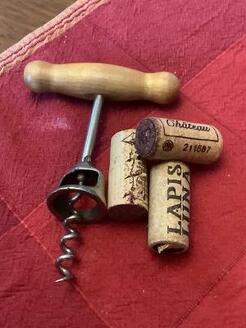 Red wine is good for the heart, too.
Red wine is good for the heart, too. I like wine – red, especially. A nice Bordeaux at the end of the week is pure pleasure. I also enjoy the ritual of opening the wine bottle with an old-fashioned corkscrew. Ceremonially, I spiral the curvy metal thingy into the firm but forgiving body of the cork. Twist, twist, twist, pull and pop! Out it comes, a bit scraggly from the puncture, red-stained at the butt end and trailing wine fumes. It’s a rare cork that doesn’t have some version of the wine’s name and logo printed upon it. Finally, I give the near-weightless cylinder a sniff, then roll it, magnifique, onto the table.
A pox, by the way, on synthetic (polyethylene) corks, as well as the dreaded metal screw-top. Not only do these devices violate centuries of wine tradition – tradition! – but they have higher carbon toeprints than a real cork made from the peeled-off bark of the cork oak tree. That harvesting process, captured in this video, amazingly does not hurt the tree.
A pox, by the way, on synthetic (polyethylene) corks, as well as the dreaded metal screw-top. Not only do these devices violate centuries of wine tradition – tradition! – but they have higher carbon toeprints than a real cork made from the peeled-off bark of the cork oak tree. That harvesting process, captured in this video, amazingly does not hurt the tree.
 My wife received this Kermit at her sweet sixteen party.
My wife received this Kermit at her sweet sixteen party. Over the years, I’ve collected hundreds of wine corks in plastic Talenti ice cream jars. The other day, while cleaning out the pantry, I decided to recycle those corks (I’ll keep the Talenti jars, which are better than Tupperware). Completing said eco-task took a bit more effort than expected. And cue Kermit the Frog singing, “It’s not easy being green…”
An InterWeb search revealed corkclub.com, sponsored by WidgetCo. They don’t actually make widgets, whatever they are, but a bunch of cork products, and they promise to recycle the corks you ship to them (your dime) and donate two cents per cork to a non-profit protecting oceans and forests. It sounded nice, if unverifiable, but I didn’t feel like packing a box and going to the post office, or paying shipment. So, Google, Google, I found the good folks at ReCORK, who set up collection sites at businesses, then divert the popped corks to companies like WidgetCo that make cork boards, cork flooring, funky shoes, and coasters.
An InterWeb search revealed corkclub.com, sponsored by WidgetCo. They don’t actually make widgets, whatever they are, but a bunch of cork products, and they promise to recycle the corks you ship to them (your dime) and donate two cents per cork to a non-profit protecting oceans and forests. It sounded nice, if unverifiable, but I didn’t feel like packing a box and going to the post office, or paying shipment. So, Google, Google, I found the good folks at ReCORK, who set up collection sites at businesses, then divert the popped corks to companies like WidgetCo that make cork boards, cork flooring, funky shoes, and coasters.
 The venerable cork oak, after a bark shearing.
The venerable cork oak, after a bark shearing. ReCORK’s website identified Social Wines in South Boston as a partner; I called the store and was told otherwise. “We used to do it with ReCORK,” said a friendly young lady. “I don’t know what happened to them.” Whatever, back to the digital data mine. A group called Cork Reharvest partners with Whole Foods. Hence, I called a few Whole Paychecks (ha ha) and discovered that the Amazon subsidiary does, indeed, recycle corks, but only at stores that sell wine. I found one, in nearby Cambridge. It was raining, so I drove there – a carbon expenditure, I know, if I weren't driving an electric car powered by solar energy.
The hipster at the customer service desk took my 140 corks (14 per Talenti jar). “It’s a great thing,” he enthused. According to Cork Reharvest, 13 billion natural corks are produced each year, and now 140 bad-boys were off the mean streets. Planet saved! I patted myself on the back (literally, I have long arms) as I purchased two new bottles of wine, organic marmalade and a package of puffy pita from New Jersey that, like most American pita, will be meh. All those things, of course, were shipped to the store by ecologically friendly magic carpets.
Why recycle wine corks? So what if they go into landfills, inhabit old jugs in basements and morph into oddball art projects? Global wine demand continues to escalate – my state of Massachusetts is fifth in the nation in per capita consumption – but recycled cork cannot be made into new wine corks because of bacterial concerns. The biodiverse, cork oak forests of southern Europe and northern Africa will live or die according to factors beyond recycling, such as development, desertification and efforts to eliminate pesky “cork taint” associated with natural cork.
I guess it comes down to this: recycling and reusing cork – as well as myriad other natural materials, from cotton pants to wooden corkscrews – may result in fewer things produced from plastic. (Even though, alas, plastic consumption is rising.) Plastic is basically oil, and oil companies are prime authors of our climate crisis. Moreover, plastic manufacturing emits high levels of carbon dioxide and toxic pollutants, and plastic waste is often dumped into the oceans. There it’s whittled down into microplastics ingested by marine life. These fragments get into your fish fillets. Bon appetit!
The hipster at the customer service desk took my 140 corks (14 per Talenti jar). “It’s a great thing,” he enthused. According to Cork Reharvest, 13 billion natural corks are produced each year, and now 140 bad-boys were off the mean streets. Planet saved! I patted myself on the back (literally, I have long arms) as I purchased two new bottles of wine, organic marmalade and a package of puffy pita from New Jersey that, like most American pita, will be meh. All those things, of course, were shipped to the store by ecologically friendly magic carpets.
Why recycle wine corks? So what if they go into landfills, inhabit old jugs in basements and morph into oddball art projects? Global wine demand continues to escalate – my state of Massachusetts is fifth in the nation in per capita consumption – but recycled cork cannot be made into new wine corks because of bacterial concerns. The biodiverse, cork oak forests of southern Europe and northern Africa will live or die according to factors beyond recycling, such as development, desertification and efforts to eliminate pesky “cork taint” associated with natural cork.
I guess it comes down to this: recycling and reusing cork – as well as myriad other natural materials, from cotton pants to wooden corkscrews – may result in fewer things produced from plastic. (Even though, alas, plastic consumption is rising.) Plastic is basically oil, and oil companies are prime authors of our climate crisis. Moreover, plastic manufacturing emits high levels of carbon dioxide and toxic pollutants, and plastic waste is often dumped into the oceans. There it’s whittled down into microplastics ingested by marine life. These fragments get into your fish fillets. Bon appetit!
 Talenti Cork Tower
Talenti Cork Tower On the ride home, however, a doubt wormed at me.
Will my 140 corks really be recycled? I mean, hipster-guy was reassuring but it’s not like he’s going to escort them along the supply chain to the cork-crumbling machine. All it takes is one tired, ambivalent worker, not to mention one MAGA hat-wearing climate change denier who's mesmerized by FOX News and deeply resents wine-guzzling coastal elites, to toss them in the trash or into the general recycling stream and the next thing you know my corks are powering furnaces in India that make a popular sugarcane goo. That strange outcome from this excellent Bloomberg story about the dirty diversion of recyclable products.
It's all about trust. I should put a cork in the paranoia, right?
Will my 140 corks really be recycled? I mean, hipster-guy was reassuring but it’s not like he’s going to escort them along the supply chain to the cork-crumbling machine. All it takes is one tired, ambivalent worker, not to mention one MAGA hat-wearing climate change denier who's mesmerized by FOX News and deeply resents wine-guzzling coastal elites, to toss them in the trash or into the general recycling stream and the next thing you know my corks are powering furnaces in India that make a popular sugarcane goo. That strange outcome from this excellent Bloomberg story about the dirty diversion of recyclable products.
It's all about trust. I should put a cork in the paranoia, right?
 RSS Feed
RSS Feed